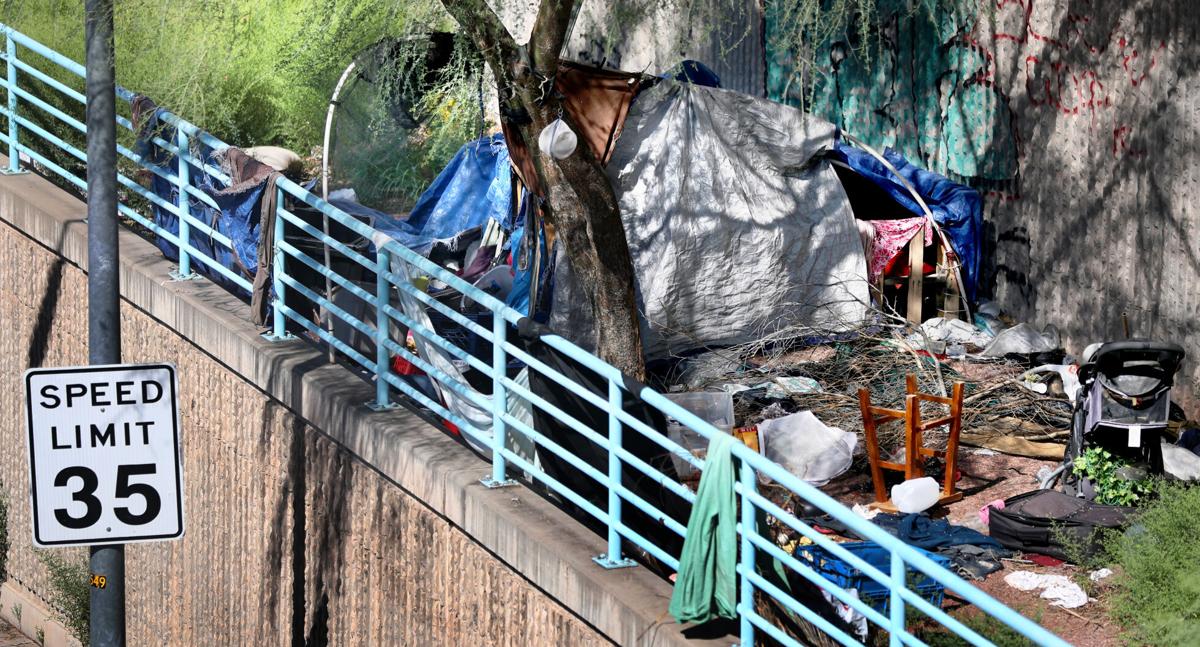Gov. Katie Hobbs has nixed legislation designed to force communities to dismantle homeless encampments and, in some circumstances, arrest those staying there.
Hobbs said the proposal offered by Sen. Justine Wadsack, R-Tucson, fails to understand there are multiple reasons people become unsheltered and remain that way.
“This legislation addresses none of those root causes, offers no pathways to assistance, and effectively criminalizes experiencing homelessness,’’ the Democratic governor wrote Monday in vetoing the bill.
Wadsack, in pushing her legislation, did not dispute that. But she said the problem of people camping on or near private property, defecating on the sidewalk and leaving needles needs to be resolved because of how it is affecting those who live or have businesses nearby.
She reacted angrily to the governor’s action.
“If Gov. Hobbs’ goal is to turn Arizona into California, her veto of this bill will surely contribute to our state’s demise,’’ Wadsack said in a written statement. “In no time, our cities will resemble that of San Francisco, with major corporations withdrawing operations and lawlessness filling our streets.’’
One provision of the bill would have required local governments, upon hearing of any homeless encampment, to notify everyone on the site they have 24 hours to leave and take their property with them. If someone refuses, the city or county could take possession of the items and dispose of them if they weren’t claimed within 14 days.
Another said anyone camping on private property is guilty of trespassing and could be prosecuted.
Wadsack said there is a growing number of people in Tucson “crying out for help.’’
“We are being infiltrated with tent cities,’’ she told colleagues. “Business owners have told stories of people walking in who have been living in their back alley that come into their businesses with machetes and chase off their business patrons.”
She said some encampments are on private property, but the owners cannot have them removed.
She cited incidents outside a five-star restaurant. “The person who owns that building has to go into work two hours earlier than everyone else, all of his employees, to clean the human feces off of the front doorsteps, to hose down the human urine, to pick up all the needles and the mattresses that are showing up,’’ Wadsack said. “And there have been no support mechanisms through the municipality.’’
Wadsack said her measure wasn’t intended to be punitive. She said it would provide city officials an opportunity to figure out what people need — whether it is help with drug issues, mental illness or economics — and connect them with services.
“We are working with Gospel Rescue Mission and multiple churches and nonprofits who are ready,’’ Wadsack said. “They have empty beds in their facilities ready to take the people and give them the help they need without having to spend additional money.’’
“The government is there to restore law and order,’’ Wadsack said. “We need to give local municipalities the teeth that they need to actually keep our streets and our private properties clean.’’
But Hugo Polanco, lobbying for the American Civil Liberties Union of Arizona, said the proposed legislation is unconstitutional.
The problem there starts with allowing the government to seize everything someone owns if that person cannot relocate within the 24-hour window, he said.
“This means the elderly, families, persons with physical disabilities and persons experiencing mental illness can have all their property seized and destroyed including their shelter, medications, identity documents, clothes and money simply because they have no place to go,’’ Polanco told lawmakers during testimony on the measure. “This cruel legislation has no place in Arizona.’’
He cited a federal appeals court ruling that prohibits property from being destroyed absent any reasonable belief it has been abandoned, presents an immediate hazard to health or safety, or is evidence of a crime.
That raised questions from lawmakers who noted that a Maricopa County Superior Court judge, ruling recently in a case brought on behalf of business owners, ordered Phoenix to clear out an encampment known as “The Zone’’ near the state Capitol.
Polanco said that was different because there was first a finding of a public nuisance. Even then, he told lawmakers, the city was not seizing and destroying the property of those being removed.
Jacob Emnett with the County Supervisors Association agreed there are legal problems with the legislation.




